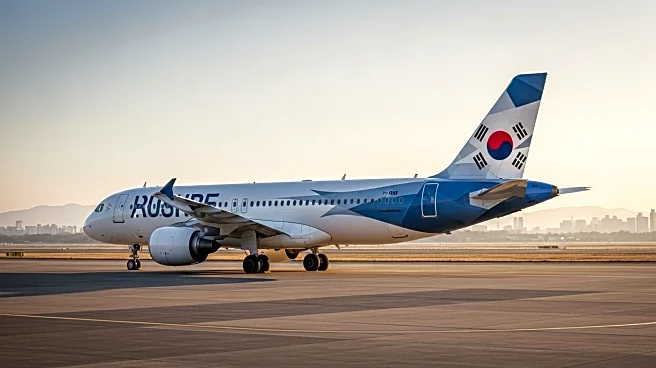What's Happening?
A South Korean charter plane has departed for the United States to bring back Korean workers detained in an immigration raid in Georgia. The raid, conducted by U.S. Homeland Security, targeted a battery factory under construction at Hyundai's auto plant, resulting in the detention of 475 workers, including over 300 South Koreans. The South Korean Foreign Ministry is negotiating with U.S. officials to expedite the return of the workers, although the plane's departure from the U.S. has been delayed due to unspecified reasons. The detained workers are currently held at an immigration detention center in Georgia, with plans for their release and transport to Atlanta for their return flight.
Why It's Important?
The incident highlights tensions between South Korea and the U.S. regarding immigration policies and visa systems. South Korean officials have long advocated for a visa system accommodating skilled Korean workers, essential for industrial projects in the U.S. The raid has caused shock and a sense of betrayal in South Korea, a key U.S. ally, and could strain diplomatic relations. The situation underscores the need for improved visa regulations to support international business operations and prevent similar incidents, which could impact South Korean investments in the U.S.
What's Next?
South Korean officials are actively discussing potential legislation with U.S. lawmakers to create a separate visa quota for South Korean professionals. The resolution of this issue may influence future industrial collaborations and investments between the two countries. The South Korean government aims to prevent deportations that could bar workers from returning to the U.S. for up to 10 years, seeking voluntary departures instead. The outcome of these negotiations could set a precedent for handling similar immigration issues in the future.
Beyond the Headlines
The raid has broader implications for international labor practices and the reliance on foreign expertise in U.S. industrial projects. It raises questions about the ethical treatment of foreign workers and the balance between immigration enforcement and economic collaboration. The incident may prompt discussions on the cultural and legal dimensions of immigration policies, potentially influencing future diplomatic and economic strategies between South Korea and the U.S.










